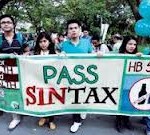There are good reasons why the P-Noy government is targeting a P60-billion annual collection from sin taxes.
Foremost is to finance health care and discourage consumption of sin products especially smoking which is responsible for at least 49 types of diseases.
Secondly, to stop and help existing smokers to quit the habit and to prevent the youth from starting and adopting the vice.
The Department of Health (DOH) position, ‘there is moderate drinking but no moderate smoking so the bigger deterrent should be in smoking.’
The government’s proposal on the excise tax amendment involves a P60 billion additional tax in the first year of implementation of excise taxes.
The House-approved version halved this to P31.35 billion and the Senate’s Ways and Means Committee, formerly chaired by Sen. Ralph Recto, further cut this to P15 billion, gaining the ire of sin tax amendment supporters.
Some sectors accused Recto of succumbing to lobby money from cigarette companies, thus, Recto decided to resign from this post and withdrew his report.
Presidential Spokesman Edwin Lacierda also explained the Dept. of Finance prefers the original P60-billion version but the department is also willing to accept a lower amount of P40-billion provided that the other objectives of the bill such as the health and the WTO issues are addressed.
Senator Franklin Drilon, who has been designated as acting chairman, announced his intention to adopt Recto’s committee report to hasten the passage of the bill.
Recto opposed Drilon’s plan, insisting that the Senate should instead adopt the Senate version filed by Senator Miriam Defensor Santiago or the House Bill 5727 which trimmed down the target collection to P31 billion, including P27 billion from the cigarette products.
Recto is willing to sign a different committee report even if it would recommend P60 billion revenue collection target.
The Dept. of Finance is amenable to lowering to P40 billion the projected revenues from the excise tax amendments.
Finance Secretary Cesar Purisima said this is primarily for the sake of health-related issues.
“It’s a minimum that will allow us to accomplish the objective of the bill,” he said.
The Department of Health (DOH) welcomed the quoted figure of P40 billion from a revised sin tax reform bill saying it was better than the P15 billion proposal of Sen. Ralph Recto.
However, the quoted amount should only be during the first year of the new law.
“We need to adjust the so called elasticity index to serve its purpose of deterring smoking. We are talking about first year for P40 billion,” said Dr. Anthony Leachon, DOH consultant for non-communicable diseases.
Leachon underscored the importance of restructuring the tax “in a way that over the medium and long term, we achieve sustainability of revenues together with achieving health objectives.”
“The amount will cover the universal health care (UHC) needs but we need more to funds safety net for farmers and workers,” he said.
According to Leachon, a tax measure must ensure that essential rates will be realized – single tier specific, indexed to nominal gross domestic products growth, significant tax increase – to generate enough revenues and to bring down consumption of tobacco and alcohol products.
“We want a system that ensures regular tax rate increases, and keeps cigarettes expensive for the young and the poor whom we care so much,” he said.
It is estimated that for every 10 percent increase in cigarette prices, tobacco consumption in the country will go down by five to seven percent.
